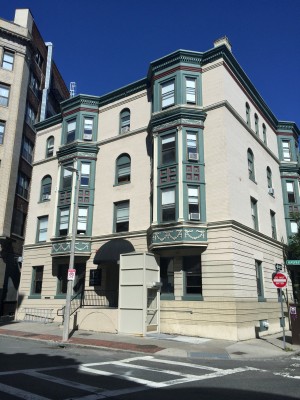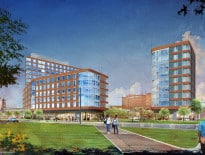Andre Jones has seen this movie before.
Berklee College of Music in 2014 began referring students in need of housing to a block of apartments owned by the Christian Science Church on Clearway Street in the Fenway. Students were encouraged to double up in two-bedroom units renting for $3,600, while existing residents’ leases were not renewed.
More than 100 residents were displaced by 192 students, prompting Jones and the Fenway Community Development Corp. to organize a series of meetings and a public protest. The college terminated the informal arrangement.
Fast-forward to 2016, and it’s same neighborhood, different battle. This time Emerson College is seeking to master lease 56 rooms in a Hemenway Street hostel to serve as a temporary dorm for 115 students while its Little Building residence hall is being renovated from fall 2017 through spring 2019. The college is seeking an amendment to its institutional master plan (IMP), the forward-looking blueprint that the Boston Redevelopment Authority (BRA) requires of the city’s colleges to lay out their real estate strategies over the next decade.
“Emerson at least is forthright,” said Jones, housing director for the Fenway CDC. “They want to do it the right way and get an amendment to the IMP. Why the BRA is facilitating this is beyond us. And they should know better.”
A BRA official said the Emerson proposal is far from a done deal. It’s attracted opposition from dozens of neighborhood residents, along with City Councilor Josh Zakim and state representatives Byron Rushing and Jay Livingstone, in an initial round of public comments that closed this month.
Residents and community activists dread worsening foot traffic and noise, diminishing diversity of housing in the neighborhood and predict the building will become a de facto dorm after the renovated Little Building reopens in 2019.
The Fenway is increasingly “caught in an economic vise,” one group of residents wrote to the BRA. The west side is being redeveloped with luxury high-rise apartments and condominiums, while the east side is increasingly overrun with students, whose demand for housing places the same upward pressure on rents.
Rosario Salerno, a former city councilor and Fenway resident since 1980, says the proposed dorm use is the worst potential outcome for the neighborhood.
“We’re in such need of affordable housing and (12 Hemenway) is a wonderful building that could be turned into a cooperative or even condos or rentals,” she said. “It could be turned into a single-room occupancy (rooming house). Boston used to have literally thousands of those in the 1970s, and it’s evaporated to next to nothing.”
Michael Rooney, a BRA project assistant, said the next step is the issuance of a scoping determination to guide Emerson’s next, and more detailed, submission on its Hemenway Street plans. That will kick off an additional 60-day comment period and public meeting. The proposal requires final approval from the BRA directors and Boston Mayor Marty Walsh.
“We like to see them address all comments from the community,” Rooney said. “We’d like to see them look into a number of different options.”
Boston University, for example, broke up its Myles Standish Building dorm renovation project into three phases to minimize disruption in response to public comments, Rooney noted.
Private Equity Takes Ownership
Gentrification and expansion of student housing have been long-time hot button issues for the 43-year-old Fenway CDC, which owns seven properties housing more than 450 low- and moderate-income residents.
Some Fenway residents object to Emerson’s selection of a building in their neighborhood, given its pattern of expansion in Downtown Crossing and Theater District. In the past decade it’s added more than 1,200 dorm rooms at 100 and 150 Boylston St. and 555 Washington St.
“Emerson College is not a Fenway institution. The Fenway is already suffering from the mass expansion of universities already in its neighborhood,” East Fenway resident Conrad Ciszek wrote in a letter to the BRA, suggesting the students be housed in new Chinatown, Downtown Crossing and Theater District developments.
Responding to inquiries from Banker & Tradesman, Emerson spokeswoman Carole McFall issued a statement that the temporary dorm would ensure that all first- and second-year students will be guaranteed housing during the next two years. In addition to the Little Building renovations, Emerson is building a 374-bed undergraduate dorm at 1-3 Boylston Place scheduled to open in 2017. The two projects will increase the college’s on-campus housing capacity by 33 percent.
But what attracted Emerson to the 4-story, 17,045-square-foot building on Hemenway Street currently operating as the Boston Fenway Inn hostel isn’t clear.
The Fenway Inn advertises shared and private rooms ranging from $28 to $84 a night. The property was acquired in June 2014 for $12.5 million by a real estate trust affiliated with the Strome Alpha Fund, a value-add private equity fund which is managed by Santa Monica, California-based Hawkins Way Capital. The fund was cofounded by Ross Walker, a 2005 Stanford MBA, and owns stakes in Hollywood nightclubs and the Oakland Athletics, according to a profile in an in-house Stanford publication.
“How is it that institutional investors from California bought a somewhat run-down youth hostel for $12.5 million less than two years ago and suddenly have discovered a market for temporary dorms?” asks Richard Giordano, director of community organizing for the Fenway CDC. “It’s not set up for that. It’s not zoned for that.”
McFall, the Emerson spokeswoman, said “this opportunity was brought to the college’s attention.” Students would not pay rent directly to the landlord, and the housing cost would be included in the room and board fee which has not been determined yet, she said.
Approving the dorm conversion, Giordano argues, would be an abuse of the IMP process by the BRA to subsidize a private developer’s speculative investment.
In the meantime, Strome Alpha Fund’s Boston portfolio is growing. On Aug. 18, its affiliate Charles Street Propco LLC 78 acquired the budget Milner Hotel at 76-82 Charles St. for $17.9 million.
Hawkins Way Capital did not respond to requests for comment.




 |
| 




